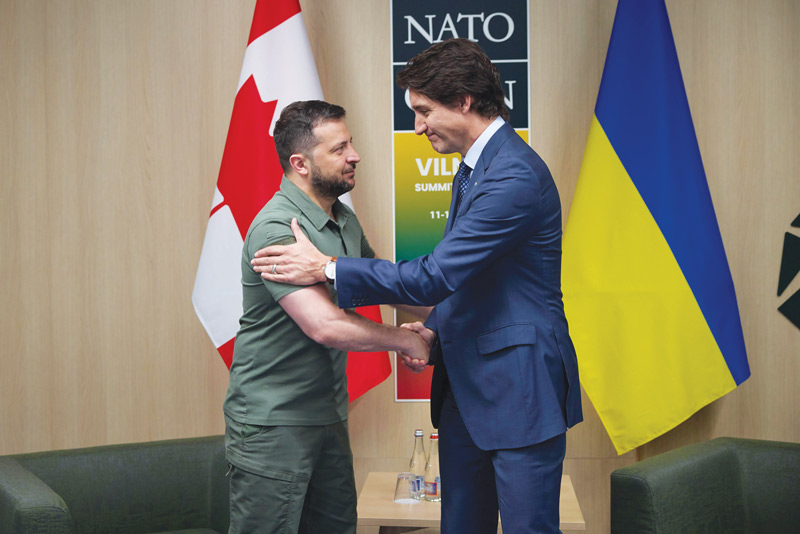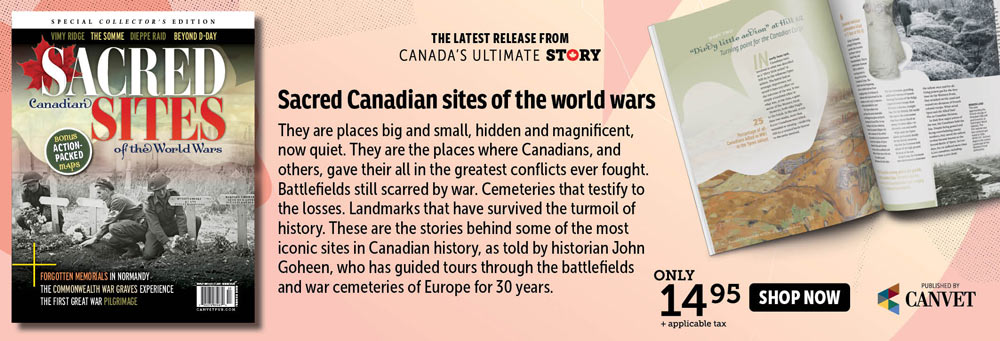
Ukrainian President Volodymyr Zelenskyy meets with Prime Minister Justin Trudeau during a NATO summit in Vilnius, Lithuania, in July 2023. [UPI/Alamy Live News/2RC3X8R]
The Russian invasion of Ukraine has altered global politics. It led NATO members to give billions of dollars in military assistance to the defenders and, with some notable exceptions including Canada, to raise their national defence budgets substantially. It also prompted Finland and Sweden to abandon their historically neutral policies to seek security within NATO.
Chinese President Xi Jinping pledged his country’s support to Moscow, but has thus far done very little to help Russian President Vladimir Putin in his war of aggression. The vaunted Russian army has proven to be a poorly led horde, and Putin, unable to secure a quick victory and seize control of Ukraine, has resorted to a brutal war of destruction, rape and the slaughter of countless innocent men, women and children.
Still, the fight continues, its casualties huge, its outcome still uncertain. Will Ukraine seize a victory that regains all its territory? Will a Russian revival gain ground? Will it end in a stalemate? Will a negotiated armistice halt the conflict?
There is one certainty: if Ukraine survives as an independent state, it must receive further protection from Russian aggression. Back in 2002, Kyiv first called on NATO to allow it to join the organization; in 2008, after being nominated by Canada, Ukraine formally applied for NATO membership; and in 2019, five years after Russia had seized Ukraine’s Crimean Peninsula, Kyiv amended the country’s constitution to include its desire to join NATO (and the European Union). Ukraine wants in.
Clearly, as Ukrainian President Volodymyr Zelenskyy understands, NATO cannot admit the country while the war continues. Doing so would oblige the organization’s member nations to join the fight, bound by the treaty’s Article 5—a war against one is a war against all. Plus, NATO (and the EU) wants Ukraine to end the rampant political and corporate corruption in the country while moving quickly toward building a more transparent and democratic society.
Regardless, NATO members have loudly proclaimed that they want Ukraine to join them soon. As Latvian Prime Minister Krisjanis Karins stated bluntly: “The only chance for peace in Europe is when Ukraine will be in NATO.”
Moscow, however, claims that one reason for its invasion was the mere possibility of Ukraine joining the Western alliance, and Russia threatened to use its nuclear weapons if Ukraine joined NATO. Putin evidently sees NATO as an existential threat to his country. With NATO members Estonia, Latvia, Lithuania and Poland bordering Russia, adding a well-armed Ukraine with a newly efficient army would massively increase Moscow’s concern.
NATO members realize this, of course, but they no longer fear Russian threats as they might have been before February 2022’s poorly executed invasion and the failed coup in late June. Moreover, unlike Putin, NATO knows that it doesn’t intend to start a war against Russia and has never even contemplated doing so. NATO was, and remains, a defensive alliance; adding Ukraine to the organization wouldn’t change that. Letting Kyiv join would, however, guarantee Western support for Ukraine in the face of any renewed Russian aggression.
Even so, Putin’s threats must be taken seriously. And it will take time for Ukraine to meet Western democratic standards. But is there a middle ground that can assure Kyiv of NATO support against further Russian attempts to swallow its people and territory whole in the meantime? There may be.
A few years before Putin took power in Moscow, Russia and Ukraine signed a Treaty on Friendship, Cooperation and Partnership that outlined the inviolability of their shared border and a respect for territorial integrity. So much for treaties, it seems, but some international agreements might be better for Ukraine. The U.S. and Britain, for instance, have offered bilateral security partnerships to Ukraine, but a firm treaty with G7 nations and NATO members would, of course, be even stronger.
A firm treaty with G7 nations and NATO members would, of course, be even stronger.
The difficulty is, even if Ukraine wins the war and liberates all of its territory, it will remain a neighbour to “a very aggressive country” as Foreign Affairs Minister Mélanie Joly said this past April. For its part, Canada wants NATO to establish a clear path for Ukraine to achieve membership in the organization. This would include a formalized extension of support—in the form of training, equipment and defence commitments—for as long as the war continues. The NATO summit in July did not offer a timetable for membership, but it did offer solid commitments.
Such a plan should go a substantial distance to easing Ukrainian fears of being abandoned by its allies if the conflict doesn’t end soon. Better still would be an agreement with the U.S. similar to that between the Americans and Israel. Under their Strategic Cooperation Agreement, any threat to Israel would lead the U.S. to provide military support as needed, including armed intervention. A promise of that sort to Ukraine would surely be enough to deter Moscow.
The difficulty, however, is that American political support for Ukraine is not as strong as it is for Israel and, if Donald Trump were to win the 2024 U.S. presidential election, any promise might be scrapped. Indeed, there might be no support for Zelenskyy’s government. And if Trump wins, his continuing, almost inexplicable admiration for Putin could lead the U.S. to abandon support for Ukraine entirely. What would NATO members do then?
The Canadian government’s position seems clear. In a visit to Kyiv this past June, Prime Minister Justin Trudeau told Zelenskyy that, “We will be with [you] as much as it takes, for as long as it takes.” He added that Ukraine’s resistance to the invaders was about “the future of us all. You are the tip of the spear that is determining the future of the 21st century.”
The G7 nations and several NATO members have made similar comments. Unfortunately, they aren’t binding.
Only bringing Ukraine into NATO is likely sufficient to guarantee the country’s independence. And NATO can’t let Kyiv into the alliance until the end of the current war and Ukraine’s further moves toward democratic reform. Trudeau is right—the future of the world is at stake in the Ukrainian fight for freedom.
Advertisement


















